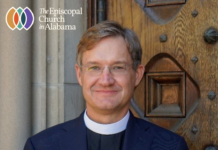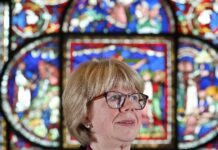The Archbishop of Canterbury has urged faith leaders from across the world to lead by example in the face of the current climate crisis.
Archbishop Welby delivered a video message to the Global Leaders Faith Summit being held in Abu Dhabi Monday and Tuesday this week. This is a meeting ahead of COP 28 which is in Dubai from 30th November to 12th December.
His video message was delivered this morning (6th of November) to an audience which included a representative from the Vatican, as well as a mix of leaders from a wide range of world religions.
The UN Secretary General, António Guterres, also spoke to the Summit via video message, stating: “We need your moral voice and spiritual authority to summon the conscience of leaders”.
Archbishop Justin reflected on the injustice of climate change, stressing how it negatively impacts on those “who have done the least to cause the problem” and increases the suffering of those “who already live in poverty and insecurity”.
Drawing on some of his recent conversations around the world he said,
“Time and time again I heard stories of people whose lives have been devastated by flooding in Bangladesh, cyclones in North America, rising sea levels in the Pacific Islands, famine in Madagascar, drought in South Sudan.”
The Archbishop pushed for progress in three specific areas. He said,
“There is much more to be done, domestically and internationally. From commitment to phasing out fossil fuels and developing technology that can deliver clean energy, to delivering on the 100$ billion climate finance promised, and agreeing on a Loss and Damage Fund.”
The Church of England has committed to carbon neutrality by 2030; completely de-investing in fossil fuels, and in 2022 it held a landmark conference of Bishops from 165 countries to develop climate policy.
Video transcript
In 2022, Bishops from around the Anglican Communion gathered together in London for the Lambeth Conference. Together we spoke of the challenges millions of Christians are facing around the world. Time and time again I heard stories of people whose lives have been devastated by flooding in Bangladesh, cyclones in North America, rising sea levels in the Pacific Islands, famine in Madagascar, drought in South Sudan.
From different corners of the world, the stories are – quite literally – flooding in of the consequences of the abuse of our planet – consequences that are being borne by our brothers and sisters who have done the least to cause the problem.
From the beginning of the Christian and Jewish scriptures, we are tasked with caring for God’s creation.
Christians believe that God has called us to care for the climate and for our neighbour, to seek the welfare of the poor and bring about justice. A crisis borne of injustice, which causes such suffering to those who already live in poverty and insecurity, and which threatens God’s own Earth, is one that demands our attention and our action.
People of all faiths share this call of reverence for our world. But we also share the concern that we are not living up to that call. Our actions must reflect our faith, and our faith must guide our actions.
Churches and Christians around the world are doing what they can to tackle the crisis. In the Church of England, we have pledged to be a net-zero, carbon neutral church by 2030. Our investors have decided to exclude fossil fuel companies from our portfolio because they are not acting fast enough to transition in line with the Paris agreement, despite our repeated attempts at engagement.
There is much more to be done, domestically and internationally. From commitment to phasing out fossil fuels and developing technology that can deliver clean energy, to delivering on the 100$ billion climate finance promised, and agreeing on a Loss and Damage Fund.
These are politically difficult decisions. This is a crisis that calls for leadership, and the leadership of people of faith could not be more important. Faith leaders represent the majority of people across the world, from both developed and developing countries. We can demonstrate to world leaders that people of faith want to see, and are willing to support, change. We can lead by example, and let world leaders know they have a mandate for bold, ambitious decision making at COP28.
Ahead of the Lambeth Conference, we planted olive trees in the garden at Lambeth Palace – one representing every country of the Communion. When I look at them, I remember the story of Noah’s Ark. After the flood, the dove brings the olive branch which signals new hope and new life.
I pray this meeting may be one which brings that hope and life to a fragile and fearful world.



